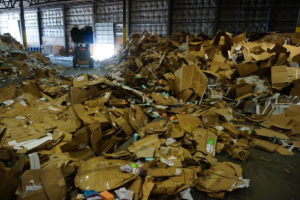Anyone who has substituted those tubes of cookie dough for Mom’s homemade recipe knows that taking the easiest route isn’t always worth the effort it saves. That’s the case with single-stream recycling – but unfortunately, the people who take the shortcuts often don’t realize the consequences.
What Works About Single-Stream
Single-stream recycling (the practice of throwing all recyclables into a single bin, rather than separating them out by material type) is easy for consumers. Trash goes in the garbage can, and all recyclables go in the recycling bin; anyone can handle that level of commitment. That ease is why single-stream recycling has been a popular system for the last few decades. Consumers who care about the environment can recycle while making minimal effort.
What Doesn’t Work About Single-Stream
It’s so easy to throw plastics, metals, glass, paper and other recyclable materials into a single bin that consumers barely have to think about it. That leads to sloppy recycling practices. Up to 30% of recyclables gathered in single-stream collection are unusable due to contamination like food residue or broken glass. All those contaminated materials have to be dealt with, eventually ending up in a landfill.
The other major issue with single-stream recycling is sorting. Separating a diverse stream of recyclables by product type is hugely time-consuming for workers and taxing on equipment. This is one instance in which quantity definitely doesn’t equal quality.
What’s Changing About Single-Stream
Until recently, recyclers could rely on Chinese importers to accept huge quantities of American materials, especially paper and plastics. That all changed in the last year, as China adopted stricter policies that American recyclers generally can’t meet. Now many recycling facilities, already working at capacity to sort through single-stream materials, are clogged with products that have nowhere to go.
We’re seeing the impact locally. The Massachusetts Department of Environmental Protection (DEP) has several disposal bans in place, which limit the ways that individuals and businesses can get rid of waste. Those bans are intended to encourage recycling – great in theory, but difficult now that facilities are regularly overwhelmed.
Some municipalities and service providers have requested waivers from MassDEP exempting them from those bans. Entities that are approved for those waivers often end up dumping their recyclable material in landfills, which isn’t a great solution for anyone. Thankfully, those waivers are issued only for short periods of time. The goal is for recycling facilities to adjust to this new normal so they can keep up with demand. There’s another goal, too: for more consumers learn about the importance of sorting recyclables.
What This Means For Your Company
Carefully cleaning and sorting recyclable materials is hugely important for companies that want to limit their environmental footprints. Properly preparing materials for recycling will also help your company generate the highest possible return. But be aware that disposing of waste materials the right way doesn’t always turn a profit. Depending on the material, the quantity, and your location (as well as market conditions), it can still be costly to recycle.
Have questions about the best and most cost-effective way for your company to dispose of large quantities of recyclable materials? Contact Miller Recycling today.

